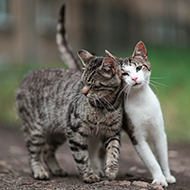
A survey has revealed more than a third of owners can’t recognise the signs.
Almost a third of guinea pig owners cannot recognise signs of stress in their pet, according to new research.
The survey of 248 guinea pig owners also found that while owners are deeply bonded with their pets — 99 per cent regularly talk to their animals — almost half are unconfident in how to reduce stress when it occurs.
Experts say the data highlights the crucial role of the pet care sector in supporting owners to bridge the gap between emotional connection and practical care.
Mary Coles, postgraduate researcher specialising in small animal health and welfare, and trustee of leading charity Guinea Pig Welfare UK, said: “Stress is one of the biggest hidden contributors to poor health in guinea pigs. It can suppress the immune system, disrupt digestion, and make animals far more susceptible to issues like bloat, respiratory infections and urinary tract problems.
“In rescue and clinical settings, we see the effects of chronic stress all too often — and they’re usually preventable. By helping owners understand subtle stress signals and the importance of environmental stability, we can make huge strides in improving welfare outcomes.”
John Chitty, qualified vet and rustee of charity Guinea Pig Welfare UK, added: “The data shows that owners genuinely care about their guinea pigs — they’re talking to them, observing them, and wanting to do right by them. But we need to bridge the gap between emotional connection and practical knowledge.
“The industry can play a pivotal role here: vets by reinforcing stress awareness in consults, retailers by guiding on social housing and enrichment, and rescues by modelling best practice.
“The benefits of better awareness include improved welfare for the animals and more confident, engaged owners who provide better lifelong care.”
The survey was commissioned by Burgess Excel for Guinea Pig Awareness Week (20-24 October).
Image © Leiter1940s/Shutterstock.com



 International Cat Care (ICatCare) has announced a free, virtual event dedicated to caring for unowned cats to explore new ideas and ways of working.
International Cat Care (ICatCare) has announced a free, virtual event dedicated to caring for unowned cats to explore new ideas and ways of working.